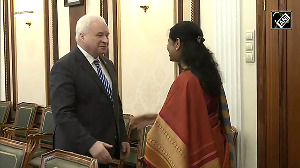
When he was young, Renuka Aradhya would beg for foodgrains, which he'd sell for a living.
Today, he owns a company that employs 150 people and directs three start-ups.
This is his inspiring story.
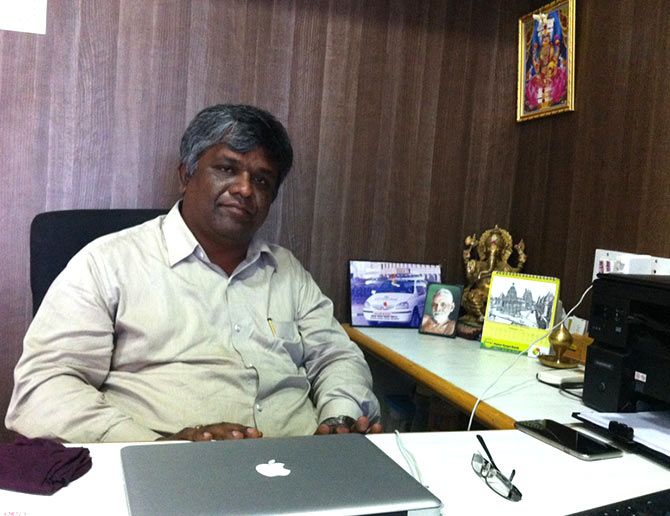
Renuka Aradhya's company today has a turnover of Rs 30 crore and employs 150 people.
This by no means is the finishing line even though the 50-year-old entrepreneur started life's race with a major handicap.
Renuka was born poor. Very poor. He has seen the kind of poverty that put him on the streets to beg. The poverty that kept him hungry both literally and metaphorically.
Where does one begin to tell this entrepreneur's story?
From pushing a handcart under a blazing sun to now owning a fleet of 1000 plus cars? Or from transporting 300 dead bodies to ferrying foreign tourists who left tips in dollars? Or from failing to clear Class X exams to now rubbing shoulders with the industry's who's who?
Or the fact that with his foresight he was able to ward off Uber and Ola poaching his business, and is making the next generation ready to dream big by bringing his daughter-in-law (who comes from a poor family) into the business.
Ernest Hemingway wrote a long time ago, "It is good to have an end to journey toward; but it is the journey that matters, in the end."
Here's Renuka's roller coaster journey in his own words because no other words will do it justice.
Every day is a winding road
I belong to a village called Gopasandra, in Anekal taluk near Bengaluru.
My father was a pujari at a temple allotted by the state government though he did not get any fixed salary.
After conducting the puja, he would go to nearby villages to beg for ragi, jowar, or rice. He would then sell the grains in the market and with the money that he got from the sale he would take care of us. We were three children -- two boys and one girl.
I would go begging with my father to these neighbouring villages, which is now Electronic City.
After I finished Class VI, my father thought he would put me in somebody's home as a domestic help to make ends meet. My school fee till Class X was taken care of by my teachers because they would get me to do their domestic work like washing utensils, dusting and sweeping.
I started working for an old man who had a severe skin ailment. I would tend to him, give him a bath, and apply skin ointment all over his body.
Since I belonged to the pujari clan, I also had to perform puja at a nearby temple. After that, I would go to school. I lived there for one whole year.
Soon after, my father admitted me to a boys' ashram in Chickpet, where I remained for three years.
The hostel would give us two meals a day, one at 8 am and the other at 8 pm and nothing in between.
I remember I was always hungry. I could not focus on my studies at all and my mind was occupied with trying to find how I could lay my hands on some food.
It was mandatory in this ashram to learn Sanskrit and the Vedas. I quickly picked this up because I realised that if I could accompany the seniors in some naming ceremony, weddings, or pujas I could eat at those events. But it was not very easy to get hold of these opportunities. I had to placate my seniors by offering to do their personal chores like washing their clothes.
As a result, I failed in Class X, passing only in Sanskrit. I then had to return home as my father passed away and the responsibility of my mother fell on me. My older brother was married and not keen on taking care of her or my sister and me.
In poverty, there is no unity. Lack of money can make people selfish and mean. If people lived happily together in the midst of poverty then they are gods.
I soon started working in a factory in Audgodi. I was there for a year.
This was followed by a stint in a plastic manufacturing company and then an ice-making factory.
I then found a job as a sweeper in an AdLabs branch.
My mind is sharp. I soon got a hang of printing and helping out with the work.
I was there for three years and had to quit because I was getting drawn into nefarious activities by some employees, who expected me to join them as well.
I am glad I quit because I heard later that they were found out and sacked.
Road to nowhere
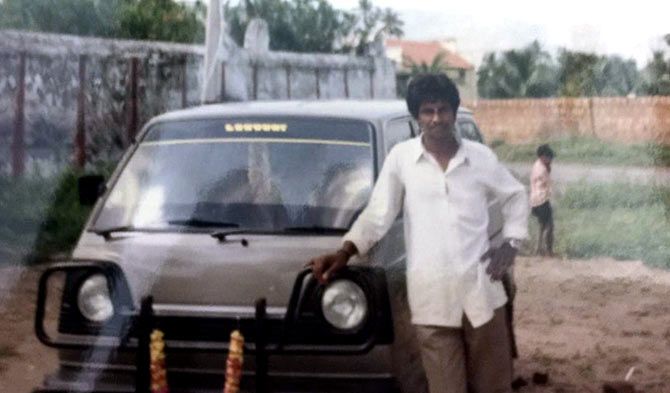
I joined Shyam Sunder Trading Company where I started working as a helper.
The company was into making and trading in bags and suitcases. I had to load a handcart with suitcases. Another helper and I took turns pushing and pulling it through the city roads and transported them from the factory to the shop. Soon, I was promoted to a sales position.
After working there for a few months, I thought 'why not start my own business?'
Since I was familiar with this business, I decided to make covers for suitcases and vanity bags.
I would take my bicycle and go around the city shouting for customers who wanted covers stitched for their suitcases and bags. It did not work out well for me and I lost Rs 30,000.
I was back to square one. My brother, who was a security guard, found me a job as one.
The reason I kept moving and starting all over again is because I wanted to achieve something. I did not have any educational background. I was not even a high-school pass. I had no money and no family connection. I did not have any mentors, no one to guide me. But I was always in search of opportunities.
I was around 18 when I got into bad company -- drinking and gambling. Thankfully, the older boys I used to hang out with moved out and I escaped a life that would not have taken me anywhere.
When I turned 20, I told my mother I wanted to get married.
I thought that marriage would make me more responsible and focussed. I was earning Rs 600 as a security guard, so to make a few extra bucks I started taking on odd jobs like that of mali (gardener), or climbing coconut trees.
I remember that I charged Rs 15 per tree and I would climb 20 trees per day.
A bend in the road
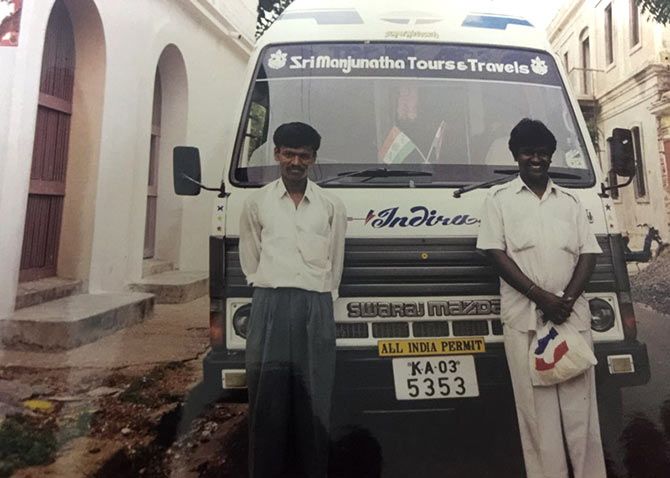
Not satisfied with what I was doing, I decided to become a driver, though I did not know how to drive.
I did not have any money to learn driving and to get a driver's licence. So I borrowed some money from my brother-in-law and pawned my wedding ring.
All went well and I got my driving licence. But the first day of my driving job was a big nightmare.
I was meant to reverse the car and park it, instead, I banged it into the gate. That job lasted only a few hours. I was back to being a security guard.
It was very depressing. I would go to the temple and bang my head on the steps lamenting my destiny and how God was being so unkind to me. I wanted to drive and yet here I was going back to doing what I thought I had come out of.
Since I was always looking out for an opportunity, I met a taxi operator who decided to give me a break.
He told me not to worry if I banged the car. 'Just run away from there,' he told me.
I was so grateful that I told him he needn't pay me till I can prove myself. I'll manage with the driver 'batha' (per day charges on an outstation trip), I told him.
I remember carrying large stones in the car. Whenever I had to halt at an incline, I would pull the handbrakes and quickly place the stones next to the rear wheels to prevent the car from rolling back.
Imagine how many stones I must have left behind me in a trail (laughs).
I was determined not to go back to being a security guard this time. In the nights, I would practice reversing the car, parking it, and managing inclines on the road without the stones. Slowly, my confidence grew.
My first outstation trip was to Gokarna. I learnt that if you drive slow and steady then everything works out well. So that's what I did.
I was so nervous that I did not dare press on the accelerator too hard. Imagine my surprise when I got this feedback from the guests saying that I was a very good driver (laughs).
One more thing I learnt was that if you take care of your customers, then you've won the battle. I got very good reviews from my customers and because of this, I was always in demand.
I worked at a transport company for four years. Besides ferrying passengers, the company also provided vehicles to hospitals like Nimhans to transport dead bodies back to their homes for the last rites.
I have transported approximately 300 dead bodies across India. And many times, I have done so alone because there was no one from the deceased family to accompany the body.
And look at the irony, immediately after I came back from one of these trips there would be a group waiting to go on a pilgrimage to Sabarimala. I would sprinkle some holy water on the vehicle and get on with the next journey.
This also taught me the impermanence of life. That nothing is enduring. That life and death are nothing but two ends of a long journey.
You know the most important learning for me in my journey has been that to earn money you must have a vision. And to make that happen, you must make the best of opportunities that come your way. You must do whatever you are doing with total dedication and keep a good track record.
One day, fortune will surely smile upon you.
Two-way street
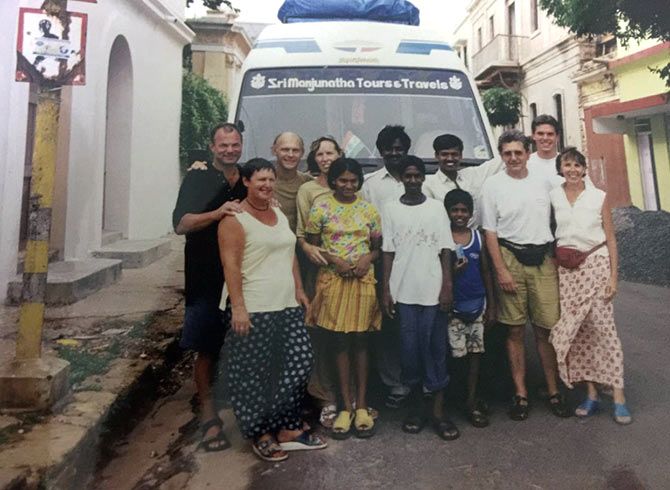
My wife used to work in the garment industry. First, she was a helper and then she went on to become a tailor. Together, we would earn Rs 900.
I was soon upgraded to another travel company. Here I got an opportunity to drive foreign tourists.
I would get good tips in dollars. Over the four years that I worked there I had a neat sum saved up from these tips.
I got my wife to withdraw her PF money, and together with the amount I had saved I started a company called City Safari with some other people.
Once the company started doing well, I was made the manager.
When I was only a driver, I would often think that one day instead of submitting a trip sheet I should be the one collecting it. And that dream came true with my new post as manager (smiles).
Around this time, I bought my first car. It was an Indica.
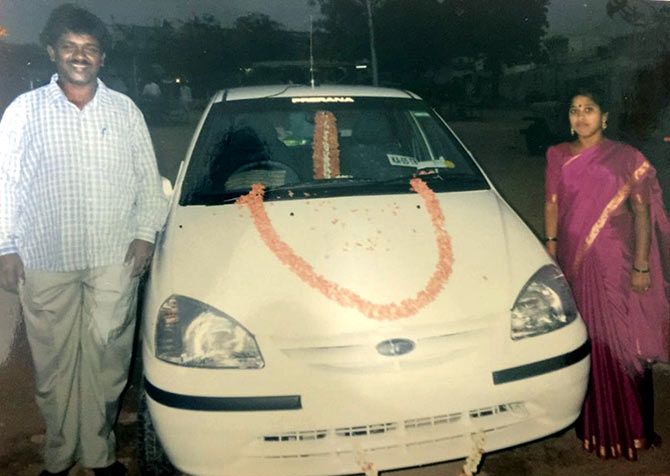
I had to take a loan from the bank. My older brother refused to be a guarantor, and I had to seek someone else's help.
In another year-and-a-half, I bought one more car. With these cars, I went to work for two years with Spot City Taxi.
As you can gather, I wanted to build my own travel/transport company.
A company called Indian City Taxi was on a distress sale. I did not have any knowledge of merger and acquisition, just paisa de do, company le lo (give money, buy the company).
I bought that company in 2006 with Rs 6.5 lakh. I had to sell all the cars that I had by then to produce this money. The company had 35 cabs attached to it and they would make Rs 1000 commission per vehicle, so in a month Rs 35,000 was assured.
I took a lot of risks, which thankfully paid off.
I had earlier registered the name 'Pravasi Cabs' when I had three cars of my own. So I called my new company that.
I was an entrepreneur now. The name came to me from the foreign tourists and expatriates I drove around. Pravasi is the Sanskrit word for expatriates.
However, it was not all that easy. There were a lot of complications.
Anyway, to cut a long story short I soon got my first client -- Amazon India. When they were setting up their Chennai office, they also helped me expand my business there.
Now the thing with corporates is they pay after three months, and I did not get my payments even after six months. So I took loans, and through the years have ended up paying lakhs as interest.
But mind you, the money was not for me. I would give my wife Rs 20,000 every month to run the house. The rest was all for the company.
I poured my days and nights with hard work. Slowly, revenue started coming in.
I thought of expanding my business and getting more clients.
What if Amazon withdrew? I would end up on the streets. Hence, I slowly got more clients like Walmart, Akamai, General Motors, and others. I did not have a sales team, no marketing team, nothing.
I never lost an opportunity even if my cut was three percent, I did not care. I just wanted to get into operations.
I had to increase my turnover, only then would I get funding from the market or banks. But if I concentrated only on profits, my turnover would decrease.
At this time, we were in on-call service, employee transport service (ETS), and train/bus ticketing (which I left after a year). I owe a lot to Amazon for supporting my growth.
I do not have any barrier to starting operations. I just look for three things: the attitude of the local drivers, their behaviour towards customers, and vehicle availability.
Are we nearly there, yet?
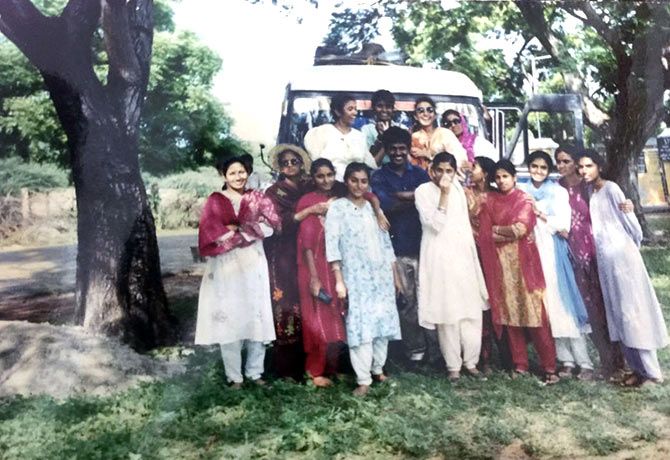
I learnt English by conversing with tourists.
When the car would be parked while the tourists did the sightseeing I would wait in the car either trying to read from an English newspaper or write passages from it.
I did not waste time gossiping with other drivers or smoking. I would either read or catch up on my sleep.
As my business grew, I felt the need to attend networking sessions, workshops and talks on marketing, customer retention or economics of running a business.
A lot of my personal growth happened this way. The other advantage I had was that I am very tech-savvy; I can work any gadget.
Three years ago, I started providing buses to schools.
Initially, the understanding was that we had to manage with the transport fee that the school charged.
The first year, I lost Rs 10 lakh. I made an agreement with the school that I would give them 35 percent for the next 10 years. So I would invest in the buses. This is the first year that I am going to break-even. I started this because I could not rely on only ETS.
And, surely, when Ola and Uber came along, it impacted the taxi industry greatly.
But I escaped because I had around 700 cabs attached to me. I lost about 200 to them. But I was still left with 500.
My idea was if I had more than 500 vehicles then no one can touch me. But if I had 100, 200 cars, then certainly I would have had reason to panic. In fact, many taxi operators had to shut shop when Ola and Uber speed chased them.
I believe that because I dreamt big, I managed to escape. If I had a small cab agency and was satisfied with earning Rs 40,000 a month, my business would certainly have been punctured.
I realised the best solution was to have a new scheme for my drivers, which was an owner-cum-driver scheme.
The deal was that for an advance of Rs 50,000, I would buy them a new car. He had to work for 36 months, and after that, the car would be transferred to his name. Whatever he earns, he keeps, we just deduct the EMI for the vehicle. We now have 300 vehicles like that, and I have the liability of all those vehicles on my head.
Besides this, we also provide training to the drivers regarding behaviour and how to manage their finances.
You know, my growth has been only this much because I wasn't educated enough. I do not know the planning and strategies like the IIT and IIM guys.
I am also a director in three start-ups. Along with six other directors, I sit on the board of loaddial.com.
It is an aggregator of goods vehicles. I am also a director in a company that will provide affordable housing to people like drivers and garment workers.
I have a few other concepts like having a Foodpanda like app for smaller cities and towns.
In three years, once I cross Rs 100 crore I will go for an IPO.
As a social responsibility, I want to encourage women drivers.
I am ready to even waive the Rs 50,000 advance if women come forward saying they want to become owner-cum-drivers. We have also created an all-women call centre for Pravasi in Karwar.
I believe in the power of the mind. What we think, we become.
How many times will you say 'I do not have any experience so how will I do this?'
Initially, there will be more criticism and less goodwill.
But slowly the criticism will fade away.
Whatever God has given me, I have shared with everyone. And I firmly believe that because of this I have managed to get myself educated and get rich.
I took my chances and during all those times when I picked up an opportunity even though it was not financially viable, I firmly believed that one day God would give me back double. Otherwise how else can a security guard today drive a Rs 23-lakh car?











